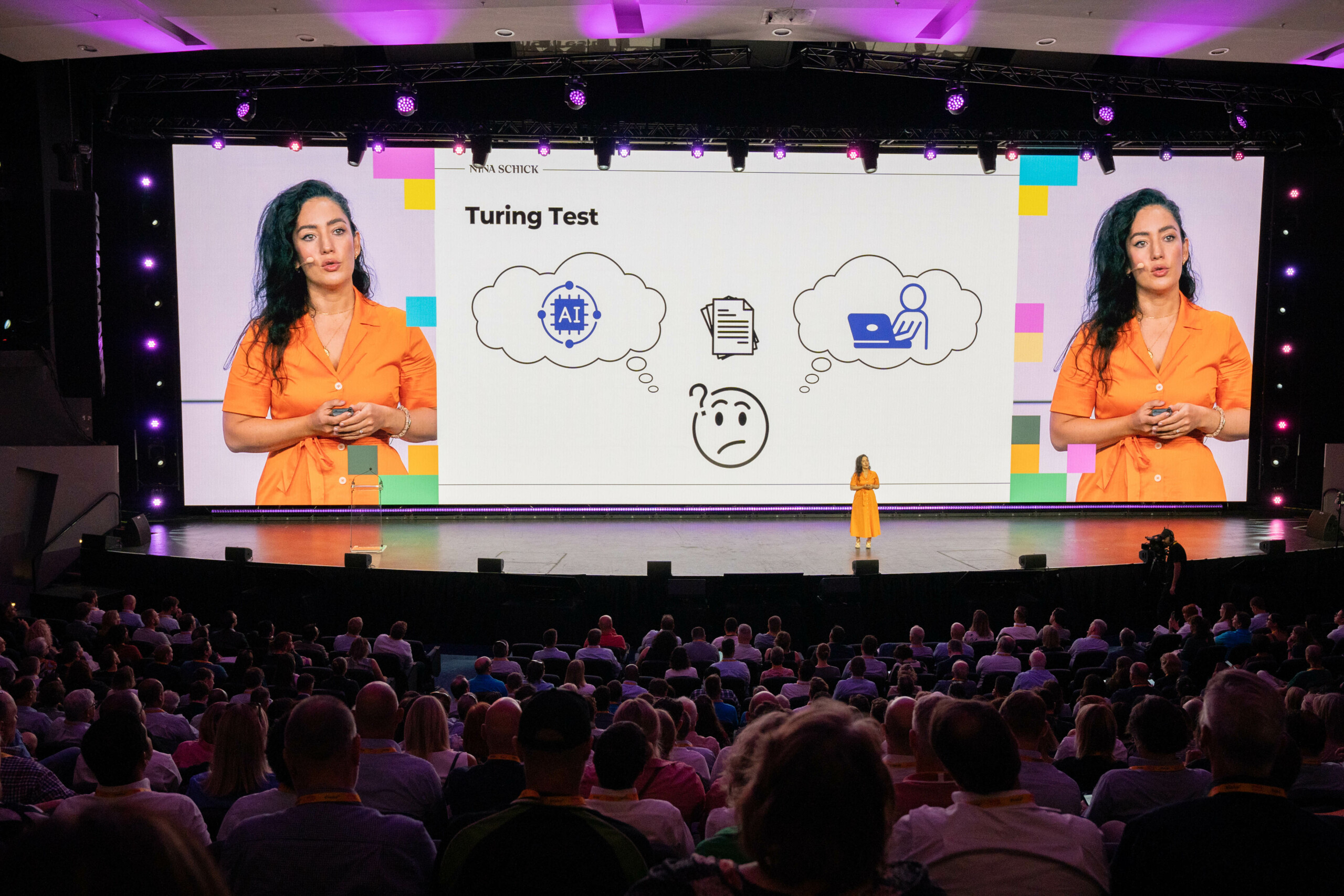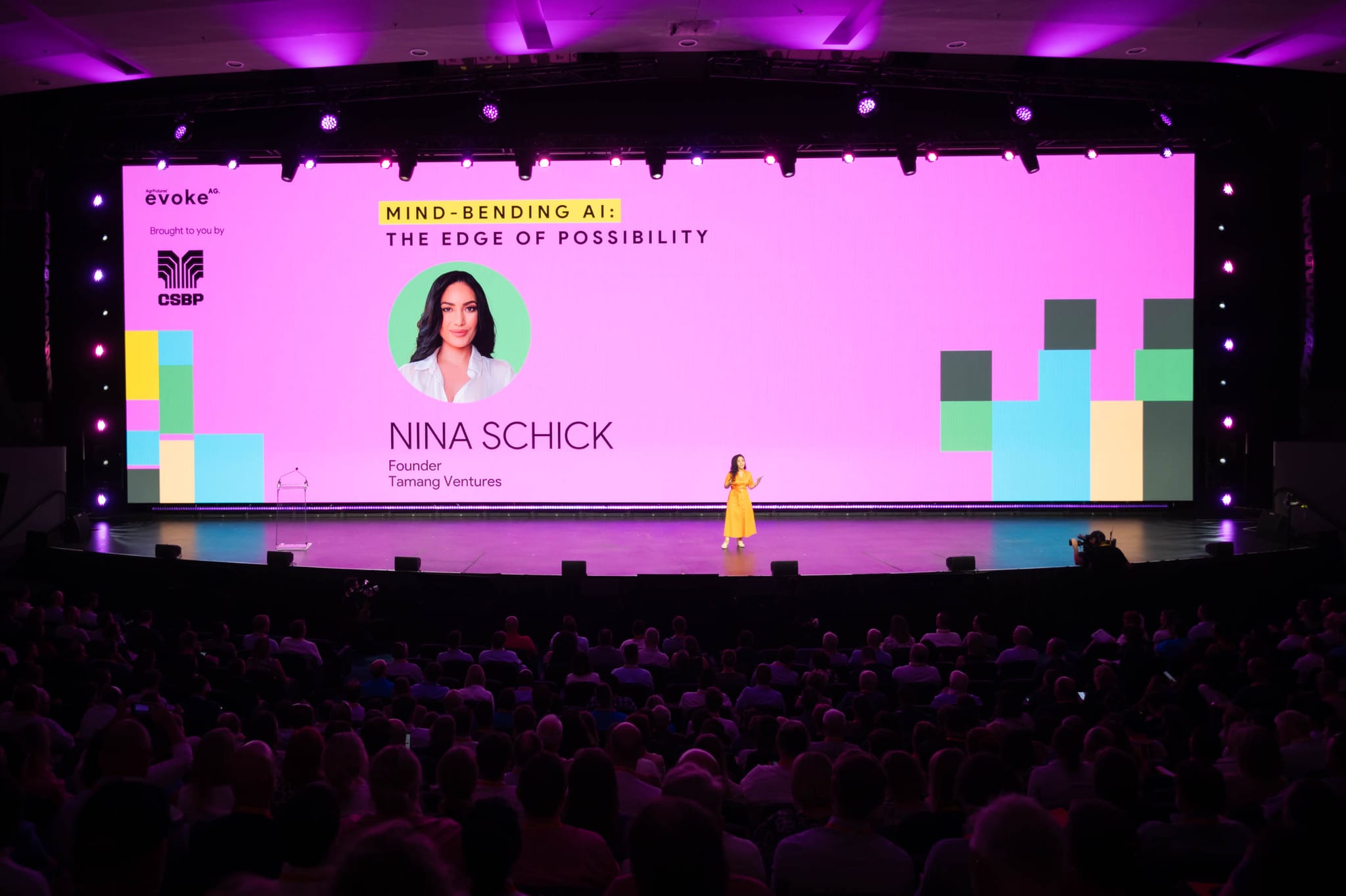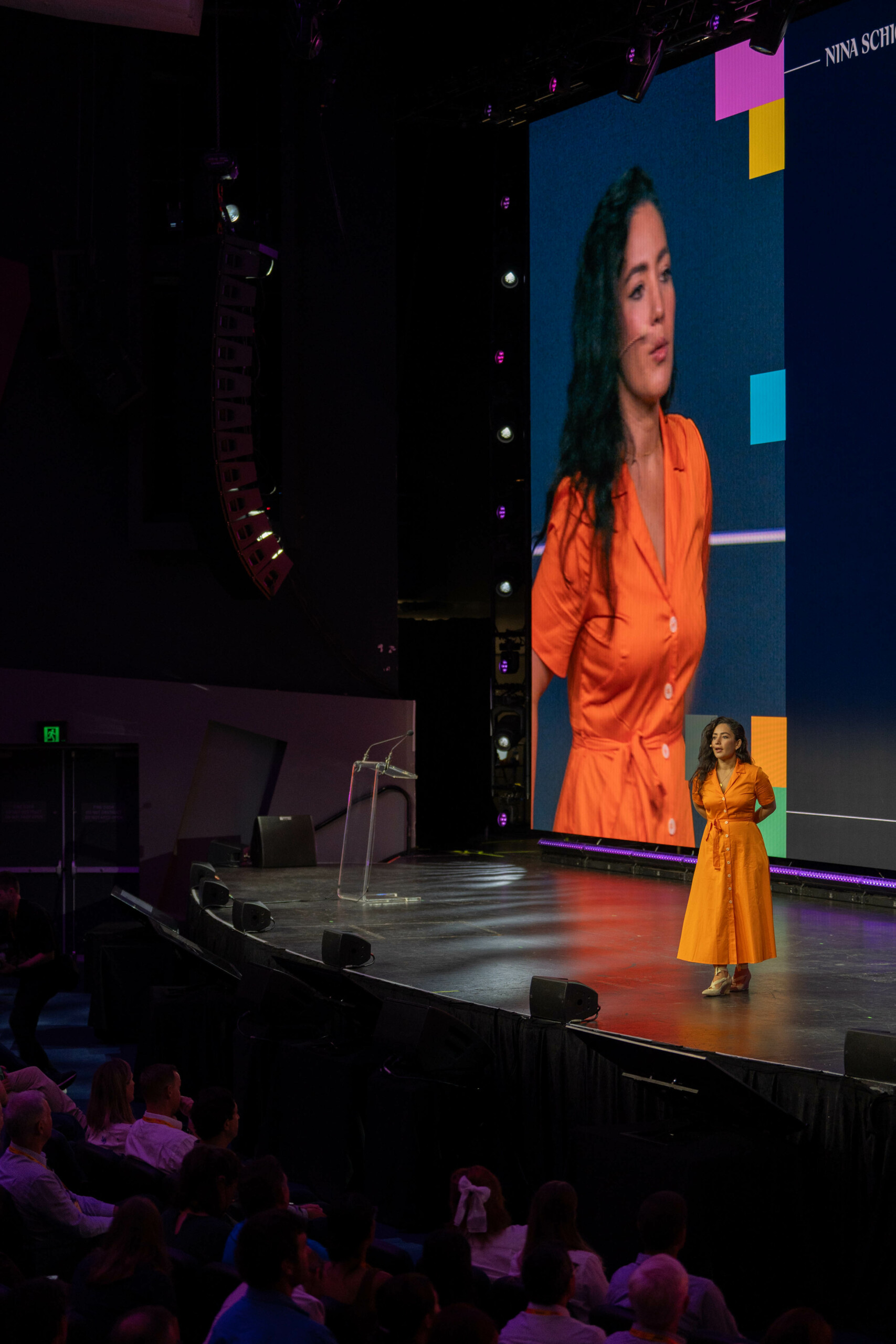Nina Schick on mind-bending AI: a catalyst for a new food future
Are the robots coming for us? Or is artificial intelligence a new ally on the path to a sustainable food future? Here, global expert in responsible generative AI, Nina Schick, demystifies artificial intelligence – and explains why food producers should embrace this kind of scary, but really cool technology to unlock the food system transformation we need to see.
We stand at the cusp of a profound tipping point in human evolution, where intelligence is no longer solely the domain of biological creatures but is also being imbued into machines.
This heralds the dawn of a new age: the Age of artificial intelligence (AI). It’s a topic permeating boardrooms and dinner tables alike, sparking discussions on how to navigate this unprecedented era.
But what is AI, and why does it matter to agriculture?
At its core, AI seeks to bestow machines with the intelligence traditionally associated only with humans. Since the advent of modern computing, this pursuit has been ongoing, raising the philosophical question: ‘Can machines truly think?’
RELATED: Getting into the Weeds: AI, Computer Vision, and the Future of Non-Chemical Weeding
Alan Turing’s famous ‘Turing test’ posited that if a person conversing with a computer cannot distinguish it from a human, then the machine can indeed be deemed to possess intelligence. Recent advancements have blurred this line further, with AI systems capable of creating content indistinguishable from human creation.

Nina delivered keynote presentation, ‘Mind-bending AI: The edge of possibility’ at evokeAG. 2024.
Plot twist: AI wrote everything you just read!
I simply typed key quotes from my address into OpenAI’s ChatGPT and asked its large language model to create an opinion piece. The result was pretty good, yes? More formal than my usual style, but good enough to fool someone who isn’t familiar with my thought leadership work.
RELATED: Embracing the future with Nina Schick and Phil Morle
Does it feel like I cheated because AI wrote it for me?
Do you feel cheated because you didn’t know?
Are we all being cheated, because up until about the last decade, we’ve safely, arrogantly assumed that intelligence is a trait that’s distinguished us as the dominant species?
How we respond to those feelings and engage with AI will reshape humanity’s story.
Can machines think?
Since the birth of modern computing in the 1940s, humanity has pursued the concept of machine intelligence – and whether there is some point at which machines will be just as, if not more, intelligent than we are.
It’s reached fever pitch in the last year or so because, seemingly all of a sudden, we’re exposed to content we assume was crafted by clever people, but was actually generated by AI. In other words, the machines have won Turing’s Imitation Game.

ChatGPT is the most (in)famous of the so-called foundational AI models – large-scale adaptable models designed for generality of outputs. The reason why it delivered such an ‘aha moment’ is the natural language processing layer that underpins it. It means we can now talk to computers as if they’re a human; they understand us in our own language; and they talk back to us in a manner so convincing that we’re fooled.
Cool trick. But can we really trust the robots?
There’s a poetic irony in the fact that modern computers use binary code, and that same binary thinking is why the debate about AI is so distorted. At one end, we have the people fixated on a future where machines are cleverer than us and take over the world (what’s known as Artificial General Intelligence, or AGI.)
On the other hand, we have the naysayers who argue that AGI will never happen because machines aren’t intelligent at all; they simply regurgitate what’s been put into them – and once we stop doing that, they go back to just being a collection of metal, plastic, and silicon.
ChatGPT assures me, “Rather than fearing a dystopian future of sentient machines, we should embrace the potential of AI to augment human endeavours across industries.”
RELATED: Implementing innovation with impact
Of course, AI would say that! But the machine is right. We’re witnessing the birth of new intelligence infrastructure where computers are meaningfully augmenting human intelligent and creative endeavours. These Artificial Capable Intelligence systems are already being woven into the fabric of our life, transforming how we work and live for the better.
For agriculture, it’s coming at us in ways that make it easier for producers to do their job – and do it better.
Think analysing satellite images; infield monitoring; assessing crop and soil health; agricultural robots like autonomous tractors and spray rigs; and predictive analytics that drive better decision-making on farm and along the supply chain.
Kind of scary, but really cool
Right throughout history, we’ve encountered general technologies that have transformed a society, and then, the world. Fire. The steam engine. Computers.
And the fascinating thing about general technologies is that we can’t avoid them. The rule is endless proliferation, and that’s certainly true for AI. If we look at the adoption curve, it’s faster than any other technology we’ve encountered before.

RELATED: ‘Fertile ground’ New report shows challenges, opportunities and perspectives of agtech in Australia
But the other interesting thing about general technologies is they’re not simply products for us to use. We become products of those technologies, too, because they change us on a biological level – an anatomical level, even. Consider how fire changed the way we organised societies, transforming where we settled, what we ate, and ultimately our digestive tract.
As a sector, food production is well primed to adapt to the general technological revolution that is the Age of AI.
Agriculture has adapted to revolution time and time again: shifting from hunter gatherer to subsistence farming; to the first then second agricultural revolutions; to now – when we need another transformation to ensure we can produce enough food to sustain a burgeoning global population while approaching the limits of what the Earth’s environment is capable of.
I think AI will be a huge part of how we make that transition.
Because we’ve gone on a philosophical journey here, let’s close with a philosophical question: What happens when we have computers that are as smart as people – but won’t get tired, or sick, or go on vacation and leave work unfinished?
It seems only fitting to let the robot respond: “It’s a future both daunting and exhilarating. The choice before us is clear: embrace the transformative power of AI or be left behind by the tide of progress. As we venture into this uncharted territory, let us tread wisely, harnessing AI’s potential to cultivate a brighter, more sustainable future for agriculture and beyond.”
Couldn’t have said it better myself.
Nina Schick is a world-leading authority on AI, and founder of Tamang Ventures – which supports companies at the frontier of responsible AI development. Nina delivered keynote presentation, ‘Mind-bending AI: The edge of possibility’ at evokeAG. 2024.
You can also tap into more articles here about the technology advancing agrifood supply chains, along with updates ahead of evokeAG. 2025 in Brisbane, Queensland. Subscribe to our monthly newsletter here.
